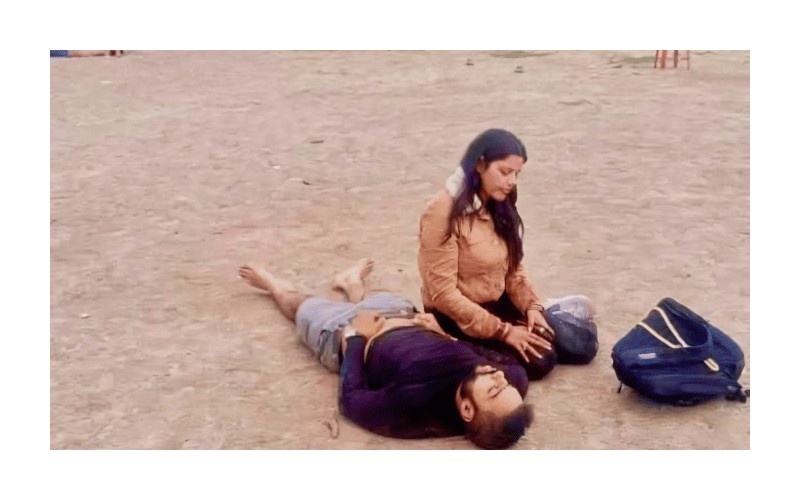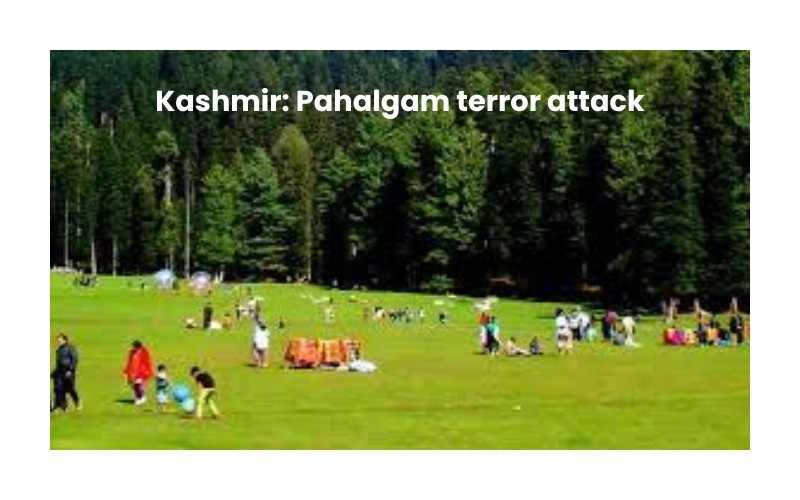April 22, 2025 – The Attack Unfolds
On February 22nd of 2025, at 2:50 PM IST, a six to ten strong militant group carried out an aggressive strike in the Baisaran Valley adjacent to Pahalgam at a tourist hotspot located in Jammu and Kashmir’s Anantnag district. Seven to four fighters used M4 carbines together with AK-47 rifles as they wore military-style uniforms while executing the attack. The gunmen ambushed a tourist group with their assault weapons, which led to the deaths of 26 people with 25 of whom were Indian nationals, together with a Nepalese visitor, while injuring more than twenty other people.
According to witness accounts, the terrorists ordered the massacre of noncompliant victims by requiring them to perform Islamic prayers. Syed Adil Hussain Shah tried unsuccessfully to defend the visitors when he became a casualty of the attacks.
Immediate Aftermath and Rescue Efforts
Survivors described widespread panic because the attack led to scenes of terror and disarray. Status holders from the local community, such as pony handlers, actively rescued victims while using both ponies and handmade stretchers for transportation. Emergency responders performed rapid medical transport of critically wounded patients by helicopter to hospitals between Anantnag and Srinagar for proper care.
Claim of Responsibility
Lashkar-e-Taiba established the Resistance Front to conduct attacks from its Pakistan base while taking responsibility for this specific incident. The Resistance Front declared that their operations aimed to fight back against the permanent changes in Kashmir’s population stemming from outside immigration.
April 23, 2025 – National and International Reactions
Narendra Modi who serves as Indian Prime Minister described the assault as an “heinous act” before making a promise to find those responsible. India made dual decisive actions by halting the implementation of the 1960 Indus Waters Treaty as well as shuttering border operations at Attari-Wagah. India made an official decision to eliminate Pakistani citizen visa exemptions within the framework of the SAARC agreement.
International nations including America, Britain and China together supported India by expressing their opposition against the assault. At the time of this incident the U.S. Vice President extended his support along with sympathy while he was conducting official duties in India.
April 24, 2025 – Escalation of Diplomatic Tensions
Pakistan implemented an aviation ban for Indian carriers and declared any water diversion attempts against the Indus source to be an “act of war.” The highest Pakistani officials gathered to create a reaction plan against India’s ongoing strategy.
Indian security forces enhanced their operations in Kashmir Valley by conducting joint patrols between the Army, along with the Central Reserve Police Force (CRPF) and Jammu and Kashmir Police forces. Security operations in Pahalgam extended through a 5-kilometer radius from the attack site.
Political and Public Reactions
The assault generated massive anger throughout the entire country of India. Different parties within the government jointly denounced the violence as they advocated national unity against terrorist groups. Political leaders gathered at a functional session within Parliament to unite efforts against this situation.
Indian citizens expressed sorrow and fury, which led them to call for powerful measures against perpetrators. In different locations throughout India, citizens organized both funeral tributes and public demonstrations to mourn the victims while supporting their relatives.
Security Measures and Ongoing Investigations
Security operations in Kashmir deepened due to intensified patrols and surveillance across the Valley. The authorities published sketch drawings of the culprits before starting a search operation to track down the criminals. The investigators exposed that the assailants recorded their assault by using body cameras, which Lashkar-e-Taiba often uses for propagandistic activities.
The Indian administration delivered bulletins advising Pakistan-based Indians to come back home during the intensifying regional conflict.
Enhanced Border Security Measures
The attack caused India to boost its security measures focused on the Line of Control (LoC) and the international border with Pakistan. The Indian Army under Border Security Force (BSF) leadership expanded patrols and surveillance while using advanced monitoring equipment to stop all border infiltration efforts.
The Indian Navy has sent its aircraft carrier, INS Vikramaditya, to the Arabian Sea to indicate its stronger maritime watch duties. The action shows India makes continuous efforts to safeguard its national borders and defend against potential security threats.
Visa Suspension and Revocation
The Indian government has taken a diplomatic measure by implementing an immediate suspension of Pakistani national visa services. On April 27, 2025, all Pakistani citizens lost their valid visas, which went into effect. Only medical visas will maintain validity until April 29, 2025.
India took this firm action to prevent security threats because it reflects the seriousness of the Pahalgam attack.
Closure of Attari-Wagah Border Crossing
The Indian government has taken a diplomatic measure by implementing an immediate suspension of Pakistani national visa services. On April 27, 20,25, all Pakistani citizens lost their valid visas, which went into effect. Only medical visas will maintain validity until April 29, 2025.
India took this firm action to prevent security threats because it reflects the seriousness of the Pahalgam attack.
Suspension of the Indus Waters Treaty
India decided to pause the operation of the 1960 Indus Waters Treaty, which forms a principal framework for sharing water resources between India and Pakistan. Successful management of bilateral ties between India and Pakistan stood on this fundamental treaty before its suspension, which now triggers critical diplomatic tension. Pakistan declared that any water diversion attempts would be treated as equivalent to war actions.
Diplomatic Expulsions and Downgrading of Ties
The response to these attacks led India to send Pakistani diplomats together with military advisers out of their borders. The government of India has simultaneously withdrawn its diplomats from Pakistan and minimized its personnel working at the Indian High Commission in Islamabad. Such diplomatic actions indicate that bilateral relations have moved to a lower level of cooperation between India and Pakistan.

Public Advisories and Travel Warnings
The government of India recommended that its citizens postpone travel to Pakistan and asked all Indian nationals in Pakistan to repatriate without delay. These security measures have been implemented to protect Indian individuals throughout increased diplomatic tensions.
Pakistan’s Retaliatory Measures
As a response, Pakistan cut off Indian airline travel through their airspace and terminated business links and ended visa issuance for all Indians. The diplomatic conflict intensified as Pakistan decided to halt the Line of Control regulations contained in the Simla Agreement.
Impact on Regional Tourism and Civilian Life
The Pahalgam terrorist attack immediately caused tourism in the Kashmir Valley to decline dramatically since the tourism sector previously functioned as the region’s chief money stream. The number of bookings to visit Gulmarg, Sonamarg, and Pahalgam has experienced severe drops. Mass cancellations worry the hoteliers and local tour operator,s while promotional activities for the summer season experienced suspension from the Jammu and Kashmir Tourism Department.
All areas in the Kashmir Valley face severe economic consequences as pony providers, together with houseboat owners and taxi operators, predict significant revenue decreases. The economic downturn, along with tense local conditions and joblessness, could lead extremists to capitalize on the situation through destructive means.
Intelligence Failure and Questions Raised
Multiple defense analysts, together with opposition leaders, have expressed doubts about intelligence failures afterward the attack occurred. Intelligence reports indicated that state and central agencies intercepted data about civilian assaults, which reportedly did not arrive at operational units before Pahalgam occurred.
The Ministry of Home Affairs ordered an internal review at the top level to analyze recent intelligence data along with the procedures that enable local institutions to receive threat assessments.
Humanitarian Response and National Solidarity
All major players in the country including celebrity figures and corporate giants and civil organizations have coordinated national efforts to assist victims’ families. The central authorities provided family members of deceased people with ex gratia compensation of ₹10 lakh yet multiple state governments presented further assistance including employment opportunities.
Various donation platforms enabled by donors throughout the world have collected crores of funds through their online crowdfunding initiatives. Doordarshan works as the national broadcaster by running its special platform “Ek Bharat, Ek Aansu” to promote public awareness and unity during this tragic moment.
Global Diplomacy: India’s Outreach to Allies
India launched diplomatic sessions with essential ambassadors from United States, France, Japan, and Australia to address rising diplomatic concerns. Foreign Minister S. Jaishankar maintains ongoing emergency video conferencing with international counterparts to provide updates about state-sponsored terrorism while gaining supporting views from allies.
The Indian government plans to submit a dossier containing proof that connects the assailants to terror camps based in Pakistan to both the UN Security Council and international forums next week.
Economic Impact and Investor Sentiment
On the following day after the attack both the Sensex and Nifty 50 experienced a major drop because investors became anxious about political risks. Foreign Institutional Investors (FIIs) made a single-day withdrawal of ₹3,500 crore because they feared Pakistan and India tensions would expand further.
The investment climate of India faces potential deterioration according to Fitch and Moody’s rating agencies because of extended conflict or additional terrorist incidents which particularly affect northern parts of the country. Market risk perceptions caused the Indian rupee to reach its lowest value against the U.S. dollar in three months.














